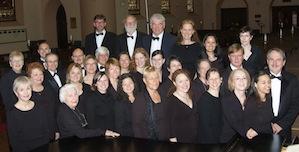Morrison Artists Series: Extraordinary Free Concerts
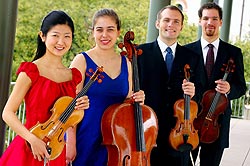
For its 57th year, the San Francisco State University's Morrison Artists Series will present such chamber-music stars as the Juilliard String Quartet, American Brass Quintet, and Trio con Brio Copenhagen between October and April. As always, all concerts for free. (But there is a catch: Unlike the good old times I remember, parking is no longer free on campus; it's $3 an hour ... with a $6 daily maximum, and how I wish the Editor allowed use of a smiley.)
Series Artistic Director Richard Festinger announced "a season international in scope, with a unique programming blend of provocative new works from the here and now with masterworks from the rich trove of chamber-music repertoire."
Besides the above-named, participants include the Jasper Quartet (J. Freivogel, violin and Sae Niwa, violins; Sam Quintal, viola; Rachel Henderson, cello), and Montreal’s Ensemble Artefact, the resident Alexander String Quartet, in music as diverse as works by Ligeti, Ravel, Hindemith, Brahms, Takemitsu, Haydn, Carter, Schubert, Mozart, Cox, Beethoven, Martin, and Norgard.
Festinger and guest artists will give an admission-free lecture one hour before each concert. The guest artists will also present master classes to students on the day of or the day after the concerts, open to the public to observe.
The Series is funded, in part, by the May Treat Morrison Trust.
Berlioz-Boito Choral Super Concert: No Mice
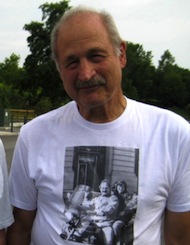
In the Aesop fable, "Parturient montes, nascetur ridiculus mus" — the mountain in labor gives birth to a little mouse.
In case of the mountain of a concert on Sunday the mighty Berlioz Requiem, the Mefistofelemore, it all began with a mousey joke. Adrian Horn recalls:
I conducted a performance of the Requiem two years ago in Rochester, and during a particularly exhilarating moment at a rehearsal, I blurted out with out giving it much thought, "How'd you like to perform this thing in San Francisco?"If his name is familiar, there is a good reason for it. Horn founded the San Francisco Choral Society in 1989. In the same year, the new organization collaborated with Eric Kujawsky's Redwood Symphony in performances of Carmina Burana and Mahler’s Second Symphony. (Nothing small-scale for these men!)After the hooting and hollering died down, I realized that fate had answered. So over the next few days I contacted some of my old friends and colleagues in San Francisco, and here we are.
Also in the early 1990s, Robert Gurney was accompanist and assistant conductor of the Choral Society, and later founded the San Francisco Lyric Chorus.
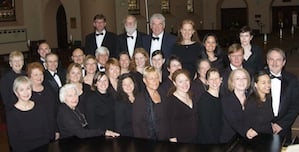
Horn — who moved to New York, where he is director of the Finger Lakes Choral Festival — along with Kujawsky and Gurney are the main collaborators in the Davies Symphony Hall adventure. Kujawsky conducts the Requiem and the "2001 Fanfare" from Strauss' Also Sprach Zarathustra; Horn the Boito Finale; Gurney the "Shepherd's Farewell" from Berlioz' L’Enfance du Christ; and Eric Townell, of the Rochester Oratorio Society, Mendelssohn's Hebrides Horn's edition of the Requiem incorporates alto choral parts into the score, countermanding Berlioz' dissing those ladies:
Purists may point out that this alters the timbre of the Requiem, but try telling that to the altos who comprise about 35 percent of most choruses. The average breakdown of most amateur choruses is 30 percent sopranos, 35 percent altos, 15 percent tenors, and 20 percent basses, plus/minus 5 percent.I not sure about that last point; Berlioz' insistence on 400 participants ("or twice or three times") may have something to do with the lamentable infrequency of this majestic work, but there is no doubt altos deserve their own parts.So the choice is to sit down one-third of your chorus or have them jumping around between the soprano and tenor parts. Altos get very testy about this. My personal opinion is that this is the one of the reasons the Requiem is not performed more.
In Davies Hall, the orchestra will be beefed up to about 105; 80 singers come from New York, and 140 from SFLC and 34 other choral groups in the Bay Area. All participants appear without pay.
Viva la Fanfare!
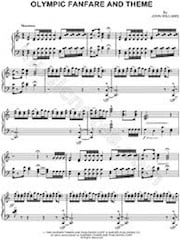
Leave it to Robert Greenberg to research the obscure history of the tune you will hear 24/7 for the next couple of weeks.
The seemingly ubiquitous Olympic Theme, with its thrumming drum opening and stately brass melody, was originally composed by a Frenchman, Greenberg says:
Oui. It ees, ow you say, true. Joseph David Buhl was a French trumpet player and composer who lived from 1781 to about 1830. Buhl composed a fair number of fanfares and trumpet calls during the Napoleonic era, among them a cavalry call with the generic title of "Salut aux étendards," meaning "salute to the banner." Once written, Bruhl’s cavalry call sat in the closet of obscurity (welcome to my neighborhood) for 150 years.Enter the conductor and violinist Felix Slatkin (father of the conductor Leonard Slatkin and the 'cellist Frederick Zlotkin.) Among many other things, Slatkin produced quasi-"Classical" record albums for the Capitol and Liberty labels. It was for just such an album entitled "Charge!" that in 1958, Slatkin commissioned a French-born composer named Leo Arnaud to write a piece. Arnaud came up with something called "The Charge Suite" which features a section entitled "Bugler's Dream."
It is pure larceny, based almost note-for-note on Joseph David Buhl's "Salut aux étendards."
Fast-forward to 1968. The Winter Olympics were held in Grenoble, France. Accidentally but oh-so-appropriately, ABC Sports chose to use the French-born "Bugler’s Dream" for its broadcast theme. The theme proved to be so popular that NBC — which now broadcasts the Olympics — has continued to use it.
The story doesn’t quite end there. In 1984, John Williams was commissioned to write a piece called "Olympic Fanfare and Theme" for the Summer Games in Los Angeles. Williams' piece begins with an arrangement of Arnaud's "Bugler’s Fanfare," which as we all now know was lifted from Buhl's "Salut aux étendards." so now, as often as not, John Williams gets the credit for having written the thing.
BBC Proms Tips: Old & New
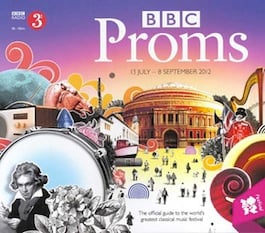
This week, SFCV colleague Jeff Dunn weighs in with thoughts and tips:
Part of me loves the tradition, and part the chance to hear new music. For the former, there's Elgar's The Apostles on Aug. 10 an oratorio masterpiece sung many times a year there, and once every 25 or 30 years here ... if that often.Tradition also reigns, of course, on the Last Night, Sept. 8, when I can sing along to "Jerusalem."
Then there are four Proms concert with especially interesting new music. There's a work that promises to be a lot of fun on Aug. 8: Richard Dubugnon's Battlefield Concerto (see details) that results in each pianist "losing" a hand:
"... as a metaphor only, of course: they will play the following Funeral and Triumphant March with only one hand each. Both hands of each pianist shall be reunited only in the last two sections: 'Peace and Reconciliations and Feasts,' where they will play their respective themes superimposed in a skillful counterpoint, then sharing their themes as a sign of peace."
On Aug. 11, some of the most "difficult" British composers converge: Ferneyhough, Birtwistle, and Finnessey. Aug. 13 offers Olga Neuwirth's Remnants of a Song ... an Amphigony. (That last fancy word is a British circumlocution for sex.) Finally, there's Emily Howard's Calculus of the Nervous Systemon Aug. 21. I'm anxious to hear what it does to mine.
Yuja, Bunny, and a Pound of Pianists
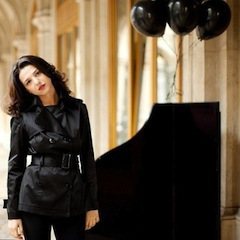
Photo by Julia Wesley
They and numerous others who know my slavish devotion to these two young pianistic superstars will understand the affectionate use of these nicknames (the second one invented by myself). At any rate Ms. Yuja Wang and Ms. Khatia Buniatishvili will join pianists ("pound" is the collective noun, don't ask me why) featured on the San Francisco Symphony schedule Oct. through Nov. Here is the illustrious company they will keep:
* Jean-Efflam Bavouzet, Bartók Piano Concerto No. 3, Oct. 4-6
* The great András Schiff in six appearances, four programs, Oct. 7, 9, 11-13, 21
* David Fray, Mozart Piano Concerto No. 22, Oct. 24-28
* Lang Lang, Bartók Piano Concerto No. 2, Nov. 1-2
* Yulianna Avdeeva, Chopin Piano Concerto No. 2 and Beethoven Piano Concerto No. 5 with the Warsaw Philharmonic, Nov. 11-12
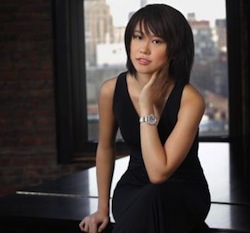
Buniatishvili will be the soloist in the Rachmaninov Piano Concerto No. 2 Oct. 18-20 in concerts conducted by Vladimir Jurowski; the program also includes Scriabin's Reverie, and the U.S. premiere of the Prokofiev-Atovmyan Ivan the Terrible, with mezzo Elena Zaremba and baritone Andrey Breus.
Wang performs different programs on two concerts: the Rachmaninov Rhapsody on a Theme of Paganini on Oct. 27; and Prokofiev's Piano Concerto No. 2 on Oct. 31.
These two concerts are in preparation for the orchestra's Asia tour in November with Yuja as soloist performing different programs in the various cities.
Apparently, plans have changed since the original announcement, which said Yuja will perform Shostakovich’s Piano Concerto No. 2 besides the Prokofiev. Good luck finding details of the Asian tour anywhere on the web!
Speaking of Pianos, Here's How They Die
The story is sad enough to make page one of the Monday New York Times:
A century after the peak of American piano manufacturing, the dump is increasingly becoming the destination for instruments that are unwanted or too expensive to maintain ...The value of used pianos, especially uprights, has plummeted in recent years. So instead of selling them to a neighbor, donating them to a church or just passing them along to a relative, owners are far more likely to discard them, technicians, movers and dealers say. Piano movers are making regular runs to the dump, becoming adept at dismantling instruments, selling parts to artists, even burning them for firewood.
"We bust them up with a sledgehammer," said Jeffrey Harrington, the owner of Harrington Moving & Storage in Maplewood, N.J.
Pianos consist of hundreds of pounds of metal, wood and intricate machinery able to channel Bach, Mozart, and Beethoven, along with honky-tonk, "Happy Birthday" and holiday tunes. It is strange to think of them as disposable as tissues. Yet economic and cultural forces have made many used pianos, with the exception of Steinways and a few other high-end brands, prone to being jettisoned.
With thousands of moving parts, pianos are expensive to repair, requiring long hours of labor by skilled technicians whose numbers are diminishing. Excellent digital pianos and portable keyboards can cost as little as several hundred dollars. Low-end imported pianos have improved remarkably in quality and can be had for under $3,000.
Crocetto, Fabiano on Stern Grove Opera Program
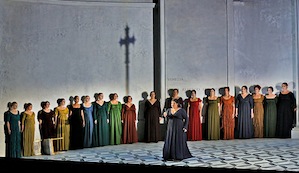
Photo by Ken Howard
One of finest, most promising of Merola/Adler alumnae, Leah Crocetto, is featured in a free Sigmund Stern Grove concert on Aug. 19, along with tenor Michael Fabiano, Adler Fellows, and the Opera Orchestra, led by Resident Conductor Giuseppe Finzi.
This is the 75th anniversary season of the free Stern Grove concerts. The opera event, sponsored by the Patricia Yakutis Endowment Fund, will present excerpts from works by Puccini, Mozart, Verdi, and more.
Crocetto represented the U.S. at last year's Cardiff BBC Singer of the World Competition. Last week, she made her stage debut with the Santa Fe Opera as Anna in Rossini’s Maometto II.
A Grand Prize winner of the 2007 Metropolitan Opera National Council Auditions, Fabiano made his San Francisco Opera debut as Gennaro in Donizetti’s Lucrezia Borgia. Anthony Tommasini's New York Times review of Maometto says of Crocetto:
Some New York opera lovers may remember Ms. Crocetto as one of the standout winners at the 2010 Metropolitan Opera Council Auditions concert at the Met. The promise of her performance that day was fulfilled for me with this moving Anna. Ms. Crocetto has an agile coloratura technique and a feeling for the Italianate style. And she won your heart during Anna’s reflective scenes and arias, sung with warmth, full penetrating sound and tenderness, especially the final aria, when Anna remembers her beloved mother.
Diablo Ballet's Gourmet Gallop

Photo by Ashraf
The Diablo Ballet, getting ready for a substantial season, is wining and dining potential donors to help make up the budget for it. The fund-raiser, "Diablo Ballet Gourmet Gallop," in downtown Walnut Creek on Aug. 9, will be attended by Japanese ballerina Mayo Sugano, and other company dancers.
The company season will feature:
* A Swingin’ Holiday, world premiere by Broadway choreographer Sean Kelly, featuring live music from 1930s and 1940s; legends Duke Ellington, Glenn Miller, Nat King Cole, and others.
* Lento a Tempo e Appassionato, West Coast premiere by Vincente Nebrada of Ballet National de Caracas, to music by Scriabin.
* The Moor's Pavane
* Two "Inside the Dancer's Studio" programs, featuring the West Coast premiere of Trey McIntyre's The Blue Boy, set to Beethoven's Piano Concerto No. 1; plus works by George Balanchine, KT Nelson, Diablo Ballet's Robert Dekkers, and David Fonnegra.
Great Cast for Carmina Burana
San Francisco Choral Society's Aug. 17-18 semistaged production of Carl Orff's Carmina Burana will feature soprano Marnie Breckenridge, baritone Eugene Brancoveanu, and tenor Brian Staufenbiel (who is also the stage director).Besides the 200-voice Choral Society, participants include Martin Benvenuto's Contra Costa Children's Chorus, California Chamber Symphony, and Perceptions Contemporary Dance Company, led by Molly Fletcher Lynch. Robert Geary conducts.
The program also features Emma Lou Diemer's Songs for the Earth, written to poems by Emily Dickinson, Omar Khayamm, Hildegaard von Bingen, Dorothy Diemer Hendry, and Mary Oliver.
11-Year-Old's Concert Tour (When?) a Guinness Record
Ethan Bortnick's The Telegraph report includes video of Ethan Bortnick receiving the recognition.Then there is this on his website:
As you may have heard, my summer tour has been postponed. I am sorry I won't see you all the next few weeks but keep checking my website for new concert dates in the future. Have a great summer and look out for a new music video I am working on! Remember, it really is all about music!

